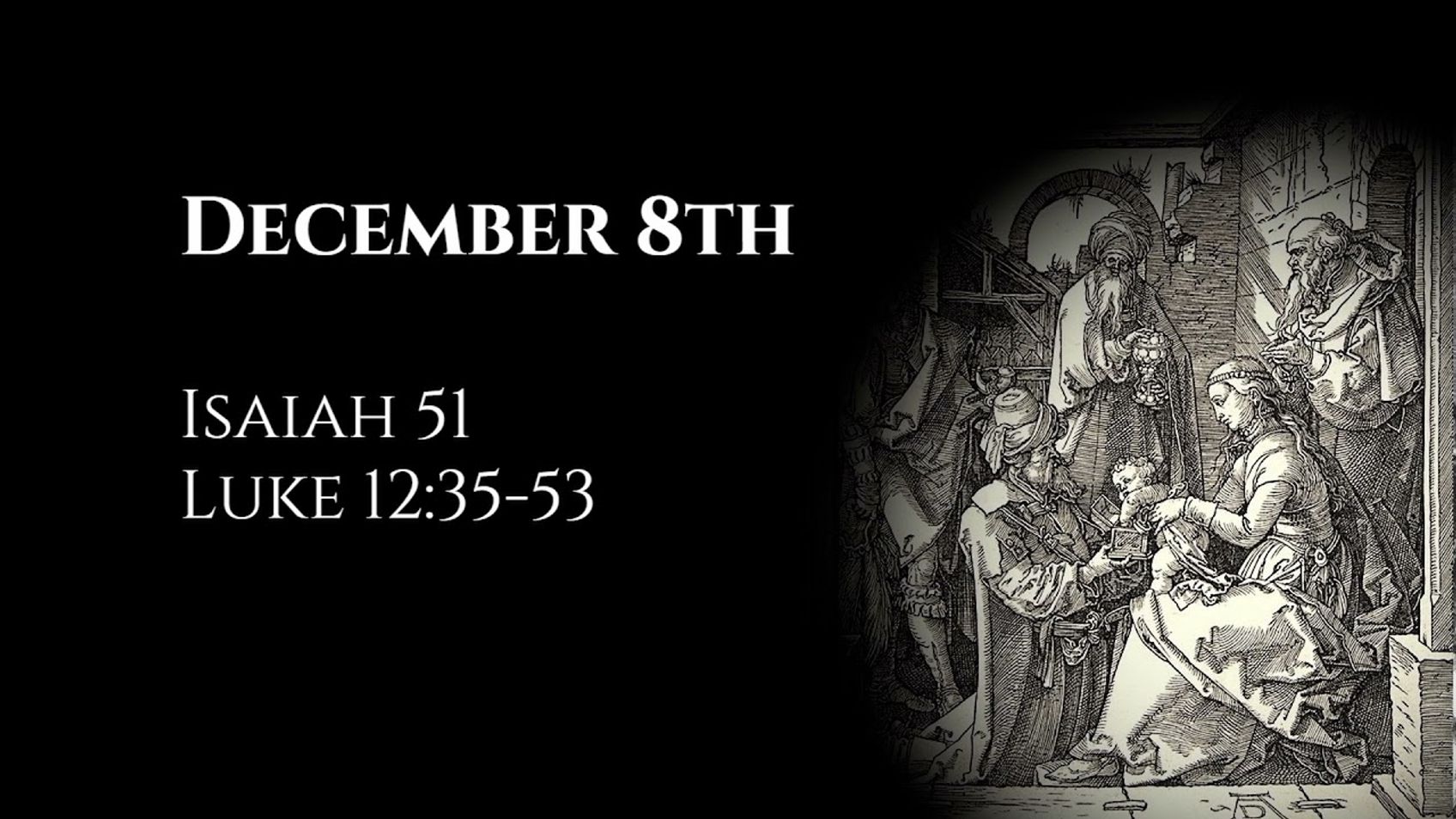December 8th: Isaiah 51 & Luke 12:35-53
December 7, 2021

Alastair Roberts
The Lord, the comforter of Zion. Being prepared for the coming of the Son of Man.
My reflections are searchable by Bible chapter here: https://audio.alastairadversaria.com/explore/.
If you are interested in supporting this project, please consider supporting my work on Patreon (https://www.patreon.com/zugzwanged), using my PayPal account (https://bit.ly/2RLaUcB), or buying books for my research on Amazon (https://www.amazon.co.uk/hz/wishlist/ls/36WVSWCK4X33O?ref_=wl_share).
You can also listen to the audio of these episodes on iTunes: https://itunes.apple.com/gb/podcast/alastairs-adversaria/id1416351035?mt=2.
More From Alastair Roberts
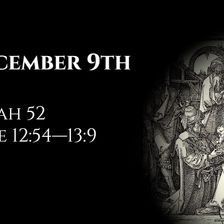
December 9th: Isaiah 52 & Luke 12:54—13:9
Alastair Roberts
December 8, 2021
How beautiful upon the mountains are the feet of him who brings good news. Knowing the times.
My reflections are searchable by Bible chapter here: ht
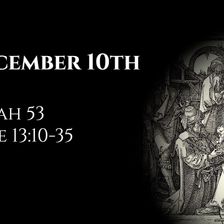
December 10th: Isaiah 53 & Luke 13:10-35
Alastair Roberts
December 9, 2021
The suffering Servant. Parables of Leaven and Mustard Seed and lament over Jerusalem.
My reflections are searchable by Bible chapter here: https://au
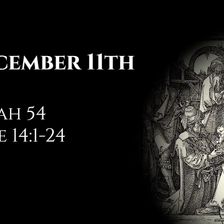
December 11th: Isaiah 54 & Luke 14:1-24
Alastair Roberts
December 10, 2021
Zion restored. The Parable of the Great Banquet.
My reflections are searchable by Bible chapter here: https://audio.alastairadversaria.com/explore/.
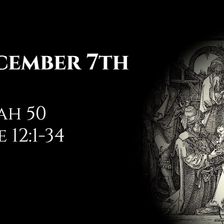
December 7th: Isaiah 50 & Luke 12:1-34
Alastair Roberts
December 6, 2021
The Servant's faithfulness in suffering and confidence in vindication. Jesus teaches the multitude.
My reflections are searchable by Bible chapter h
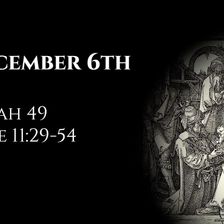
December 6th: Isaiah 49 & Luke 11:29-54
Alastair Roberts
December 5, 2021
The servant of the Lord, the Lord's salvation to the ends of the earth. Woes upon the Pharisees and lawyers.
My reflections are searchable by Bible c
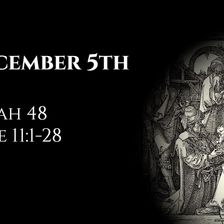
December 5th: Isaiah 48 & Luke 11:1-28
Alastair Roberts
December 4, 2021
Listen to me, O Jacob! The Lord's Prayer.
My reflections are searchable by Bible chapter here: https://audio.alastairadversaria.com/explore/.
If you
More on OpenTheo

Does God Hear the Prayers of Non-Believers?
#STRask
February 26, 2026
Questions about whether or not God hears and answers the prayers of non-believers, and thoughts about a church sign that reads (as if from God), “Just

Christmas Cranks and Christmas Blessings with Justin Taylor and Collin Hansen
Life and Books and Everything
December 17, 2025
If you are looking for a podcast where three friends talk about whatever they want to talk about and ramble on about sports, books, and grievances, th

Protestants and Catholics: What’s the Difference? With Chad Van Dixhoorn, Blair Smith, and Mark McDowell
Life and Books and Everything
November 26, 2025
How should Protestants think about the Catholic Mass? About the Eucharist? About the history and development of the papacy? In this panel discussion,

When I Can’t Stop Thinking About Something, Is That God Speaking?
#STRask
December 1, 2025
Questions about whether having a recurring thought is an indication God is speaking to you, what to say to someone who says they sinned because “God t

Why Are So Many Christians Condemning LGB People Just Because of How They Love?
#STRask
January 15, 2026
Questions about Christians condemning LGB people just because of how they love, how God can expect someone to be celibate when others are free to marr

Is It a Sin to Feel Let Down by God?
#STRask
November 6, 2025
Questions about whether it’s a sin to feel let down by God and whether it would be easier to have a personal relationship with a rock than with a God

What Do You Think About Churches Advertising on Social Media?
#STRask
January 19, 2026
Questions about whether there’s an issue with churches advertising on social media, whether it’s weird if we pray along with a YouTuber, and whether C

The Man on the Middle Cross with Alistair Begg
Life and Books and Everything
November 10, 2025
If you haven’t seen the viral clip, go see it right now. In this episode, Kevin talks to Alistair about the preaching clip he didn’t intend to give, h

Is 1 Corinthians 12:3 a Black-and-White Tool for Discernment?
#STRask
October 27, 2025
Questions about whether the claim in 1 Corinthians that “no one can say ‘Jesus is Lord’ except in the Holy Spirit” is a black-and-white tool for disce

How Would You Convince Someone That Evil Exists?
#STRask
November 17, 2025
Questions about how to convince someone that evil exists, whether Charlie Kirk’s murder was part of God’s plan, whether that would mean the murderer d

Why Should We Pray If God Already Knows What’s Going to Happen?
#STRask
January 29, 2026
Questions about why we should pray if God already knows what’s going to happen, how the effectiveness of prayer is measured, and whether or not things

How Do I Determine Which Topics at Work Are Worth Commenting On?
#STRask
January 5, 2026
Questions about how to determine which topics at work are worth commenting on, and a good way to respond when you’re in a group Bible study and hear e

Why Is It Necessary to Believe Jesus Is God?
#STRask
February 19, 2026
Questions about why it’s necessary to believe Jesus is God, whether belief in the Trinity is required for salvation, and why one has to believe in the

How Can I Explain Modesty to My Daughter?
#STRask
November 27, 2025
Questions about how to explain modesty to a nine-year-old in a way that won’t cause shame about her body, and when and how to tell a child about a pre

What Tools of Reasoning Help You Know What’s True, Right, and Good?
#STRask
December 4, 2025
Question about what tools of reasoning help us determine whether something is true or false, right or wrong, good or bad before bringing Scripture int
